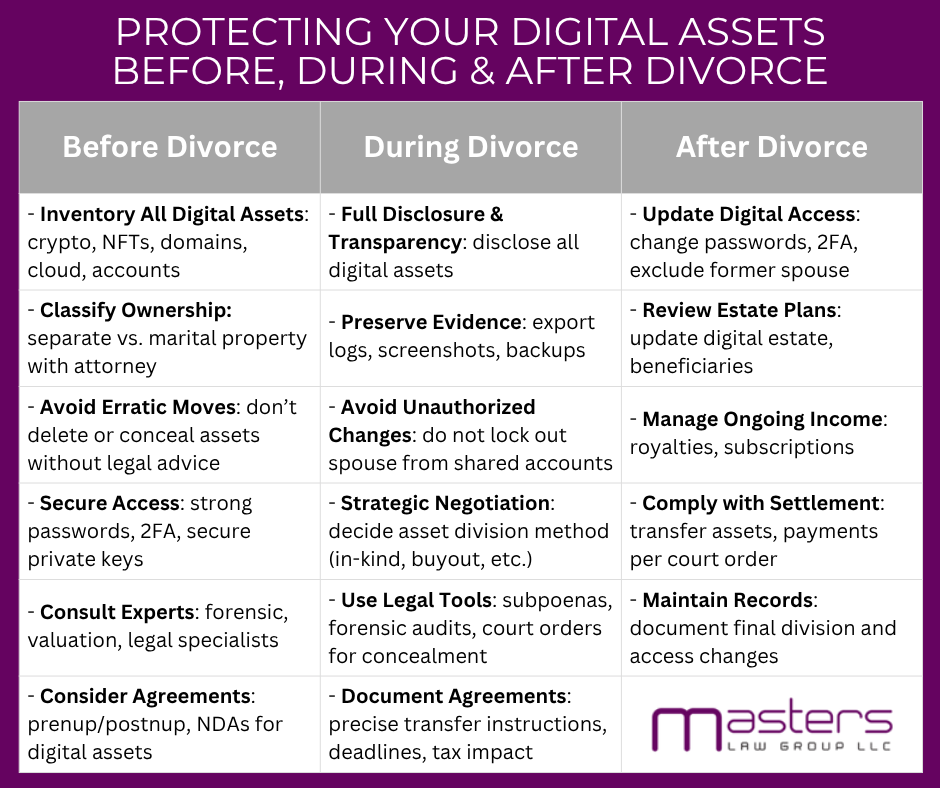Protecting Your Digital Assets: Cryptocurrency and Divorce on Data Privacy Day
Our financial lives extend far beyond traditional bank accounts and physical assets. With the rise of cryptocurrencies like Bitcoin, Ethereum, and other digital currencies, the landscape of divorce proceedings has grown more complex.
These decentralized and often anonymous assets can complicate the division of marital property, making Data Privacy Day—an annual reminder of the importance of safeguarding personal and financial information—a perfect time to discuss cryptocurrency, privacy, and divorce.
At Masters Law Group, we understand that divorce is already a stressful, emotionally charged process. When digital currencies enter the equation, the stakes are higher, and the legal, financial, and privacy considerations multiply. This guide explores the intersection of cryptocurrency, data privacy, and divorce law, providing insights to help protect your interests.
Why Crypto Is Front-Page News in Today’s Divorces
In early 2026, the cryptocurrency landscape continues to evolve rapidly, with major regulatory discussions and enforcement actions reshaping how digital assets are disclosed and divided in legal settings. The SEC’s renewed focus on crypto asset transparency and the IRS’s updated reporting requirements (effective this tax season) have made accurate valuation and documentation of digital currencies more critical than ever in divorce proceedings. Additionally, market volatility following the rebound of Bitcoin and Ethereum prices has heightened concerns over timing and fair valuation in marital asset division. These developments underscore why staying informed and working with legal professionals experienced in digital finance is essential when navigating divorce in the age of cryptocurrency.
At Masters Law Group, we understand that divorce is already a stressful, emotionally charged process. When digital currencies enter the equation, the stakes are higher, and the legal, financial, and privacy considerations multiply. This guide explores the intersection of cryptocurrency, data privacy, and divorce law, providing insights to help protect your interests.
The Rise of Cryptocurrency in Marital Finances
Cryptocurrency has evolved from a niche investment into a mainstream financial tool. Its unique properties—digital, decentralized, and often pseudonymous—make it appealing to investors seeking flexibility, privacy, and high-growth potential.
For divorcing couples, cryptocurrency can complicate asset division in several ways:
- Valuation challenges: Crypto prices fluctuate rapidly, meaning the value of a marital asset can change dramatically in a short period.
- Privacy and anonymity: Digital wallets and blockchain addresses can make it difficult to trace ownership and transactions.
- Hidden assets: Because cryptocurrency can be stored offline or in private wallets, one spouse may attempt to conceal assets during divorce proceedings.
These issues make it essential for both parties to fully disclose their digital holdings and for legal professionals to understand the nuances of blockchain technology and digital wallets.
Data Privacy Day: Why It Matters in Divorce
Data Privacy Day, celebrated annually on January 28, highlights the importance of protecting personal information in an era of digital vulnerability. Divorce can expose sensitive financial and personal data, and when combined with cryptocurrency, the risk of data breaches or misuse increases.
Key Data Privacy Considerations in Divorce:
- Digital wallets and keys: Cryptocurrency is secured by private keys. Losing access to a private key means losing access to the associated assets. Sharing these keys without proper legal safeguards can be risky, but failing to disclose them can be considered hiding assets.
- Transaction history on the blockchain: Blockchain is a public ledger, meaning transactions can be traced if the addresses are known. However, sophisticated users can employ privacy coins or mixing services to obscure transaction trails, complicating forensic accounting efforts.
- Online accounts and exchanges: Many divorces involve subpoenas for records from cryptocurrency exchanges. Data privacy laws, both domestic and international, govern how these platforms can release information. Legal guidance is essential to help ensure compliance while protecting client rights.
- Digital communication: Emails, messaging apps, and cloud storage may contain evidence of cryptocurrency holdings or transfers. Parties should handle these communications carefully, balancing disclosure requirements with personal privacy rights.
Legal Implications of Cryptocurrency in Divorce
Dividing cryptocurrency in divorce is not just a financial issue; it is a legal one. Courts are still developing consistent frameworks for addressing digital assets, but several key principles have emerged.
1. Cryptocurrency as Marital Property
In most jurisdictions, any asset acquired during the marriage is considered marital property, regardless of whether it exists in physical or digital form. This includes cryptocurrency purchased or mined during the marriage, as well as digital assets gifted to one spouse.
Example: If a couple purchased Bitcoin together and its value soared during the marriage, a court may treat the appreciation as marital property, subject to division.
2. Disclosure Requirements
Transparency is critical. Courts expect both parties to fully disclose their digital assets, just as they would bank accounts, retirement funds, or real estate. Failure to do so can lead to:
- Legal penalties, including fines or contempt of court
- Unfavorable division of assets
- Accusations of fraud or concealment
3. Valuation Challenges
Cryptocurrency valuation is highly volatile. Attorneys often retain forensic accountants or crypto valuation experts to determine asset values on relevant dates, such as the date of separation or divorce filing.
4. Division Methods
Courts may employ several approaches to dividing cryptocurrency:
- Physical division: Transferring actual coins or tokens to one spouse.
- Cash equivalent: Selling the cryptocurrency and dividing the proceeds.
- Trust or escrow: Holding digital assets in a neutral account until the division is finalized.
Each approach carries risks, particularly related to price volatility, transaction fees, and security.
Privacy Risks and Protective Measures
Divorcing individuals face several privacy risks when digital assets are involved:
- Hacking or theft: Digital wallets are vulnerable to cyberattacks if proper security measures are not in place.
- Identity theft: Personal information linked to cryptocurrency accounts can be used maliciously.
- Legal exposure: Improper handling of digital evidence or transactions can create liability issues.
Best Practices for Protecting Digital Assets:
- Use secure wallets: Hardware wallets or cold storage options provide enhanced security over online exchanges.
- Document everything: Keep meticulous records of cryptocurrency purchases, transfers, and valuations.
- Limit access: Avoid sharing passwords or private keys without proper legal guidance.
- Engage forensic experts: Certified forensic accountants specializing in cryptocurrency can help trace hidden or mixed assets.
- Consult an attorney experienced in crypto law: Legal guidance is critical to ensure compliance with both divorce law and data privacy regulations.
Cryptocurrency Fraud and Divorce
The anonymity and decentralization of cryptocurrency make it attractive not only to legitimate investors but also to those seeking to commit fraud. In divorce proceedings, this can manifest as:
- Asset concealment: One spouse transfers cryptocurrency to private wallets to hide assets.
- Fraudulent valuation claims: Misrepresenting the value of digital holdings to influence asset division.
- Unauthorized trading or withdrawals: Engaging in risky transactions to deplete marital assets before settlement.
Recognizing and addressing potential fraud early is essential. Courts increasingly rely on digital forensics to uncover concealed assets and hold parties accountable.
The Role of Masters Law Group
At Masters Law Group, we understand the intersection of divorce law, digital assets, and data privacy. Our attorneys are experienced in navigating the complexities of cryptocurrency, helping ensure clients’ financial interests and personal information are protected.
How We Help:
- Comprehensive asset discovery: Identifying and valuing all digital holdings.
- Privacy protection: Safeguarding sensitive financial and personal data throughout divorce proceedings.
- Legal strategy: Crafting tailored approaches for equitable asset division, including cryptocurrency.
- Collaboration with experts: Working with forensic accountants and crypto valuation professionals to provide courts with accurate information.
- Education and guidance: Helping clients understand their rights, responsibilities, and potential risks related to digital assets.
By combining legal experience with technical knowledge of cryptocurrencies, we help clients navigate divorce with confidence and peace of mind.
Practical Tips for Divorcing Couples
If you are facing divorce and own or suspect your spouse owns cryptocurrency, consider the following steps:
- Inventory your digital assets: Document wallets, exchanges, and blockchain addresses.
- Consult a knowledgeable attorney: Choose a firm experienced in cryptocurrency and divorce law.
- Secure your assets: Protect private keys and sensitive information.
- Avoid unilateral transactions: Do not transfer or sell digital assets without legal guidance.
- Engage forensic experts if needed: Ensure a fair valuation and detection of hidden assets.
These steps help prevent disputes, reduce risk, and ensure compliance with legal obligations.
The Future of Digital Assets in Divorce
As cryptocurrency adoption continues to grow, courts are increasingly encountering cases involving digital assets. Legal frameworks and case law are evolving, emphasizing transparency, equitable division, and protection of privacy.
Key trends to watch:
- Standardized valuation methods: Expect courts to rely more on forensic accounting for cryptocurrencies.
- Blockchain for evidence: Courts may increasingly accept blockchain transaction records as admissible evidence.
- Regulatory guidance: Data privacy laws, including GDPR and domestic protections, will influence how digital assets are handled in divorce proceedings.
- Increased attorney specialization: Lawyers with experience in digital currencies and privacy law will become essential for divorce cases involving significant cryptocurrency holdings.
Final Thoughts
Data Privacy Day serves as a timely reminder that digital security and transparency are essential in modern divorce proceedings. Cryptocurrency introduces new complexities to asset division, from valuation challenges and privacy concerns to the potential for hidden assets or fraud.
At Masters Law Group, we provide the experience, strategic guidance, and technical knowledge necessary to navigate these complexities. Our goal is to help protect your financial interests, safeguard your personal information, and guide you through the divorce process with confidence.
If you are facing divorce and own or suspect the existence of cryptocurrency, don’t leave your digital assets unprotected. Early legal guidance can prevent disputes, uncover hidden assets, and help ensure a fair and equitable resolution.
Contact Masters Law Group today to schedule a consultation and protect your financial and digital privacy during this critical time.
Disclaimer: This blog is for informational purposes only and does not constitute legal advice. Please consult a qualified attorney regarding your specific circumstances.







































